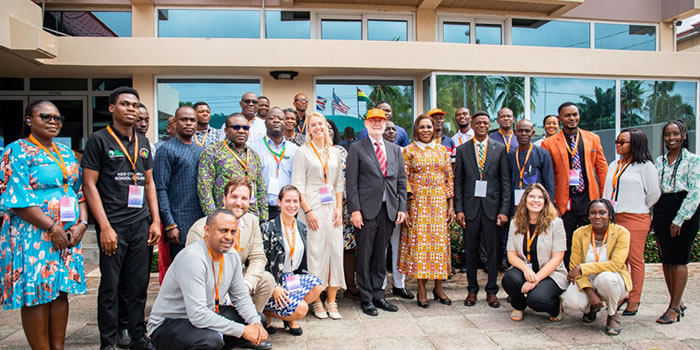Adverts
SPORT
Support Accra to develop infrastructure for cycling, walking - Mayor urges
The Chief Executive of the Accra Metropolitan Assembly, Elizabeth K. T. Sackey has invited stakeholders in the built environment to contribute their knowledge to developing the city's infrastructure for walking and cycling.

Date Created : 7/19/2023 12:00:00 AM : Story Author : Ghanadistricts.com
According to her in the Central Business District (CBD) of Accra, the only missing mode of transportation was cycling. The Mayor of Accra said this when she officially opened the Accra Cycling Workshop being held in the city on the theme: "A Human-Centred Approach Cycling for Everyone."
She disclosed that the Assembly had begun a decongestion exercise to free the walkways of traders and improve conditions for pedestrians to walk in the city adding that Accra's Climate Action Plan (CAP) recognizes walking and cycling as an essential means of reducing transport-related emissions to mitigate the effects of climate change.
"The health benefits of “walking and cycling” as transportation choices cannot be overemphasized. Accra's Climate Action Plan sees walking and cycling as important means of reducing transport-related emissions...We want to use this opportunity to appeal to our professionals of the built environment, to improve their knowledge on walking and cycling and help us shape our infrastructure around active transportation, "she said.
She used the opportunity to call for support to mobilize financial resources to build the needed walking and cycling facilities for communities in the city.
She was hopeful the outcome of the workshop would quicken collective efforts to mitigate the effects of climate change and improve public health to achieve sustainable mobility as well as deepen the long-existing relationship between the Dutch and Ghana to attract additional resources to build the technical and policy capacity in cycling for Accra.
H.E. Mr Jeroen Verheul, Netherlands Ambassador to Ghana in an address said some challenges preventing cycling in Accra included unfavorable climate conditions, lack of infrastructure as well as culture.
"In my home country in the Netherlands, I lived about 7km away from my work. So I could do the 7km by train, bus or car but I decided to cycle because it was easy to do that. It’s active, you get fresh air so it’s very conducive but here in Accra, I live less than 3km from my work which is half the distance back home, yet I don’t cycle to work in Accra. It is because it is too hot in Accra, not safe to cycle.
I think the challenges that prevent cycling from becoming an acceptable mode of transportation are the climate, infrastructure and culture. These are the things we need to tackle in order to promote cycling in Accra,” he added.
He stressed that active mobility had the potential to transform cities and contribute to improving road safety, the environment and air quality as well as promote inclusive growth, sustainable development and a high standard of living and well-being.
Participants who were drawn from the AMA and other sister Assemblies are expected to be introduced to the different approaches to cycling and its infrastructure, the essential components needed to ensure safe and inclusive cycling environments as well as proposal writing and financing walking and cycling.


 facebook
facebook X (twitter)
X (twitter) Youtube
Youtube +233 593 831 280
+233 593 831 280 0800 430 430
0800 430 430 GPS: GE-231-4383
GPS: GE-231-4383 info@ghanadistricts.com
info@ghanadistricts.com Box GP1044, Accra, Ghana
Box GP1044, Accra, Ghana